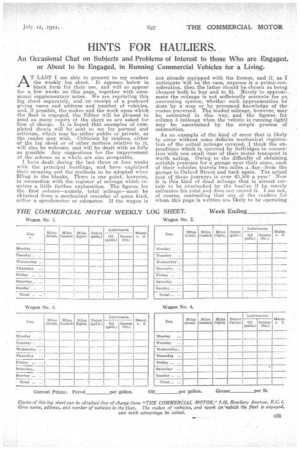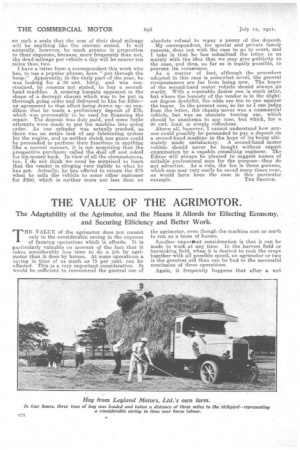• HINTS FOR HAULIERS.
Page 27

Page 28

If you've noticed an error in this article please click here to report it so we can fix it.
An Occasional Chat on Subjects and Problems of Interest to those Who are Engaged, • or About to be Engaged, in Running Commercial Vehicles for a Living.
AT LAST I am able to present to my readers the weekly log sheet. It appears below in blank km for their use, and will so appear for a fewweeks on this page, together with occasional supplementary notes. We are reprinting this log sheet separately, and on receipt of a postcard giving name and address and number of vehicles, and, if possible, the makes and the work upon which the, fleet is engaged, the Editor will be pleased to send as many copies of the sheet as are asked for free of charge. It. is hoped that examples of completed sheets will be sent to me for perusal and criticisin, which may be either public or private, as the reader may wish. -Criticism by readers, either of the log sheet. or of other matters relative to it, will also be welcome, and will be dealt with as fully as possible. Any suggestions for the improvement of the scheme as a whole are also acceptable.
I have dealt during the last three or four weeks with the principal headings, and have explained their meaning and the methods to be adopted when filling in the blanks. There is one point, however} in connection with the register of mileage which requires a little further explanation. The figures for the first column—namely, total mileage—must be obtained from a-mechanical recorder of some kind, either a speedometer or odometer. If the wagon is
not already equipped with the former, and if, as I anticipate will be the ease, expense is a prime•consideration, then the latter should be chosen as being cheaper both to buy and to fit. Merely to approxi-. mate the mileage is not sufficiently accurate for an accounting system, whether such approximation be" done by a map or by presumed knowledge of the routes traversed. The loaded mileage, however, may be estimated in this way, and the, figures for column 3 (mileage when the vehicle is running light) may be ascertained by the simple process of subtraction.
As an example of the kind of error that is likely to occur without some definite mechanical registration of the actual mileage covered, I think the expenditure which is incurred by Selfridges in connection with one small item of their motor transport is worth noting. Owing to the difficulty of obtaining suitable premises for a garage near their store, each of their vehicles travels two miles a clay—from the garage to Oxford Street and back again. The actual cost of these journeys is over .M,500 a year! Now it is this kind of dead mileage that is almost certain to be overlooked by the haulier if he merely estimates his total and does not record it. I am not, of course, contending that any of the readers for whom this page is written are likely to be operating
on such a scale that the cost of their dead mileage will be anything like the amount stated. It will naturally, however, be much greater in proportion to their expenses, because, more frequently than not, the dead mileage per vehicle a day will be nearer ten miles than two.
I have a letter from a correspondent this week who has, to use a popular phrase, been "put through the hoop." Apparently, in the early part of the year, he was looking for a 30 cwt. lorry, and was constrained, by reasons not stated, to buy a secondhand machine.. A seeming bargain. appeared in. the shape of a decrepit chassis which was to be put in thorough going order and delivered to him for £250— an agreement to that effect being drawn up—on condition that he made a preliminary deposit of 275, which was presumably to be used for financing the repair. The deposit was duly paid, and some futile attempts were made to put the machine into going order. As one cylinder was actually cracked, an there was an entire lack Of any lubricating system for the engine, and as neither clutch nor gears could be persuaded to perform their functions in anything like a normal manner, it is not surprising that the prospective purchaser called the deal off and asked for his money back. In view of all the circumstances, too, I do not think we need be surprised to learn that the vendor is clinging very tightly to what he has got. Actually, he has offered to return the 275 when he sells the vehicle tosome other customer for 2250, which is neither more nor less than an absolute refusal to repay a penny of the deposit. My correspondent, for special and private family reasons, does not wish the case to go to court, and I take it that he has submitted the letter to us mainly with the idea that we may give publicity to the case, and thus, so far as is legally possible, to prevent its recuTrente.
As a matter of fact; although the procedure adopted in this case is somewhat novel, the general circumstances are far from being new. The buyer of the second-hand motor ,vehicle should always go. warily. With a reputable dealer one is much safer, but where the honesty of the vendor is in the slightest degree doubtful, the odds are ten to one against the buyer. In the, present case, so far as I can judge from the letter, the chassis 'never was a commercial vehicle, but was -an obsolete touring car, which should be anathema in any case, but which, for a 30 cwt. load, is simply .ridiculous.
Above all, however, I cannot understand how anyone could possibly be persuaded to pay a deposit on a second-hand machine in the hope of its being ultimately made satisfactory. A second-hand motor vehicle should never be bought without expert examination by a capable consulting engineer. The Editor will always be pleased to suggest names of suitableprofessional men for the purpose—they do not advertise. As a rule, the fee is three guineas, which sum may very easily be saved many times over, as would have been the case in this particular
example. THE NKOTCH.
































